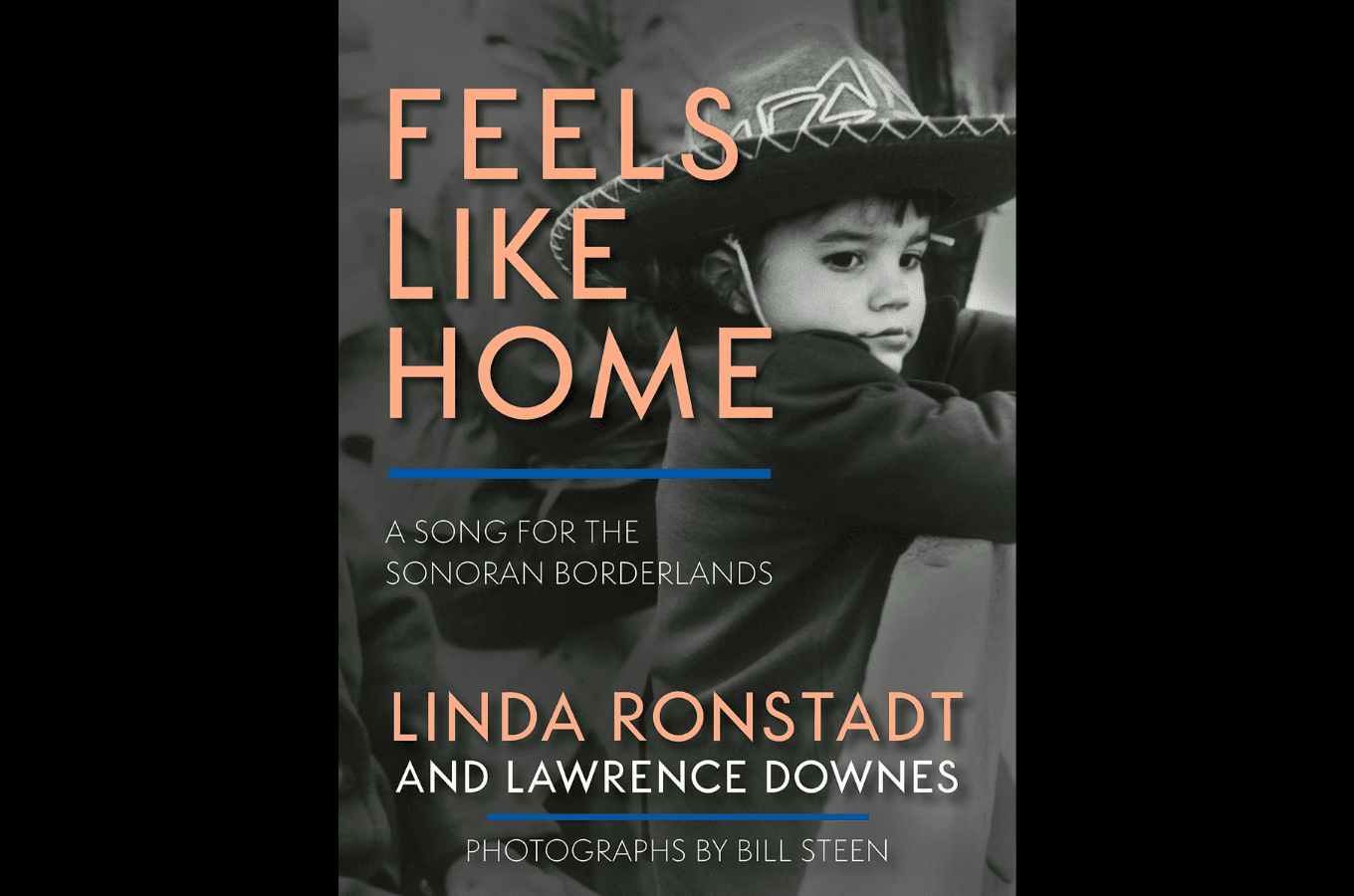THE READING ROOM: Linda Ronstadt Shares Life Story in a Desert Landscape

In her 2013 autobiography Simple Dreams, Linda Ronstadt shares her life as a key part of the Southern California country rock scene of the late ’60s and early 1970s. Her voice soars in those pages much as it does on albums such as Don’t Cry Now, Hasten Down the Wind, Canciones de Mi Padre, and Feels Like Home. Simple Dreams carries readers back to a place and time in which artists floated in and out of one another’s studios and lent their voices and playing to one another’s albums. Her book remains one of the best music memoirs out there because of its focus on the music itself and reflections on the process of making it.
Now Ronstadt goes beyond her life in music to share stories dear to her heart about family, about home, about food in her stunning new book, Feels Like Home: A Song for the Sonoran Borderlands (Heyday). She partners with New York Times journalist Lawrence Downes and her friend and photographer Bill Steen to share her memories of life in Tucson, Arizona, and Sonora, Mexico, the place to which her great-grandfather, Friedrich August Ronstadt, immigrated from Germany in the early 1840s. He eventually settled in Tucson, where the Ronstadt family became one of the scions of the community. Though Linda Ronstadt grew up “in middle-class comfort in twentieth-century Tucson, far removed from any need for desert self-sufficiency,” her world is animated by the Sonora of her great-grandparents, and her love of the desert, its raw beauty and its food, flows through her blood. As she writes, “The Río Sonora region is one of the prettiest corners of Mexico, a landscape. Etched by sunlight and carved by wind and softened by lush evergreens. This stretch of desert happens to be my foothold in the world. I believe in genetic memory, that sense of a place that lives in the bloodstream and passes down the generations. Wherever I’ve lived, wherever I travel, my soul is always winging it down the road, south over the border, back to my land and roots in Sonora. I feel the pull from Banámichi like a summons from my father’s parents and their parents and grandparents, from a chain of ancestors, most of whom I never knew.”
Ronstadt vividly describes the harshness and beauty of this land, and her childhood memories of it. “Living in a harsh climate has its rewards. There’s something to be said for the way a land of extreme weather sharpens and stokes emotions in a way that blander environments can’t. In blazing heat, a well-timed passing cloud or the blessed whisper of a breeze feels like an answered prayer. There’s relief and almost drunken delight when summer’s unbearable grip is finally broken by the wild monsoons of July and August, or even just when the swamp-cooler (low-tech air conditioners that work through the cooling collision of evaporating water and very dry air) on the roof kicks in and the heat indoors retreats enough for your thoughts to solidify out of boiled mush.”
Never one to hold back her words, Ronstadt deplores the bigotry and racism that continue to infect her beloved part of the world, but she recalls that such attitudes are hardly new. “I know my father and uncles dealt with bigotry and racism as businessmen in twentieth-century Tucson … In the 1960s, when Tucson was pursuing literal erasure of Mexican identity, my dad and uncle Edward were among the Mexican American leaders who urged the city to save some its Hispanic past.” Today, in the midst of the violence and anti-immigrant racism in our country, especially at the southern border, she wonders what to do. “We can’t control how others feel about us,” she writes. “But we have a say in how we feel about ourselves. Rejecting being devalued is half the battle. We can work to be comfortable in our own skins, to carry ourselves knowing that we belong, that this land is our land.”
Music can play a role, reflects Ronstadt, in providing strength for individuals and communities to embrace one’s identity, even in the face of hatred and racism. “And this is what music and art can do. When you tap into the strength of those who came before you, those who
took their love and suffering and made it music, you become strong and resilient, too … When I made the album Canciones de Mi Padre, singing Mexican songs in Spanish, it wasn’t as radical departure as some made it out to be. I simply wanted to take my singing in a direction I had long wanted to go, to finally perform the songs I’d learned as a girl. It was an artistic project, not a political one. But inevitably my identity became a part of it, and while some white critics initially dismissed the album as trivial exotica, the sturdy and beautiful songs spoke for themselves. The records sold by the ton … It was thrilling and humbling to see Mexican Americans young and old embrace the records as a source of community pride — not that they needed any reason from me to feel proud of their roots and musical heritage. I felt proud to be able to honor my father and aunt Luisa and our shared Sonoran roots.”
Food is also a way of bringing communities together, and has as much power as place does to define family. Scattered through the book are recipes for dishes that Ronstadt recalls from meals growing up and continues to make. Some are family recipes, such as Ronstadt Family Meatballs / Albondigas de le Familia Ronstadt, while others, like Tepary Beans / Frijoles Téparis, are ancient and obscure.
Feels Like Home issues an invitation to sit a while and listen as Ronstadt regales us with warm stories of the ones she loves, the places woven into the fabric of her being, and the food and music that sustain us all.




